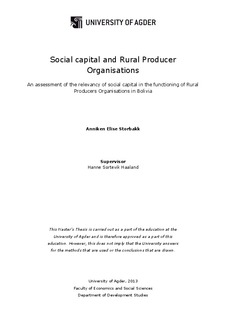| dc.description.abstract | This thesis examines the relevancy of social capital in the functioning of Rural Producer Organisations (RPOs). RPOs are made up of farmers that want to improve their economic situation by facilitating access to the market or by for instance refining a product, selling certified seeds, or setting prices etc. In this paper it is investigated whether social capital is an important factor in determining participation in the RPOs. Low membership participation is a problem in the two empirical cases of RPOs in Sopachuy, Bolivia. Social capital is a concept that has received more attention the last two decades because of its perceived effects on poverty reduction and successful development projects. The emphasis on ties, trust and norms in the communities is also in line with another contemporary concept in development strategies namely participatory development from bellow. The social capital theory used by Ahn & Ostrom (2002) connects social capital with collective action theory since social capital is what makes people act together. According to them social capital is based on the three forms trustworthiness, networks, and informal/formal rules. Through the exploration of these forms of social capital and the effects on interaction among people I argue in this paper that social capital is important to understand when initiating support for these Rural Producer Organisations. When aid is given from NGOs and the state mainly as investments in physical capital and production- related training then this aid can create dependence and undermine self-organisation and the development of networks between people. The members in the RPOs are very much distanced from the management in the organisation and participation is in many instances reduced to receiving information at meetings. This weakens the sustainability of the organisations since members – that are the highest organ for decision making, does not generally know what is going on in the RPO, while the state and NGOs are very much involved. The lack of social capital in the community and in the organisations is acknowledged as a reason for the low participation among members. Other factors are also recognised as important when evaluating participation, such as a changing society towards a money economy, migration, the organisational structure of the RPOs, low levels of human capital and a history of discrimination and marginalisation of the indigenous people in Bolivia. Participation in development is recognised as paramount as this can create networks among people, a self-initiative, mobilisation, empowerment, human capital and sustainability. Social capital and participation are intertwined and will enhance each other, but in the study area social capital is argued to be especially important in order to create a foundation for action as the members are very isolated from each other. | no_NO |
